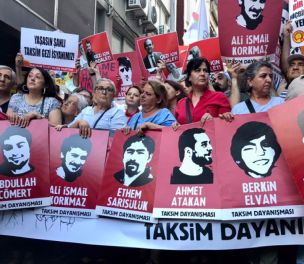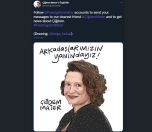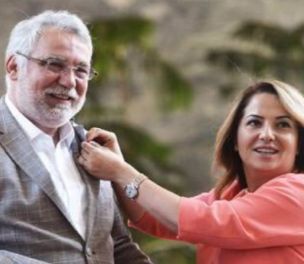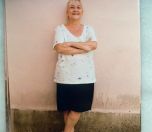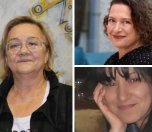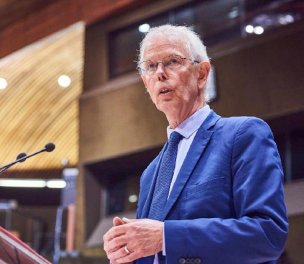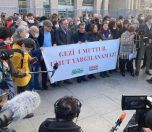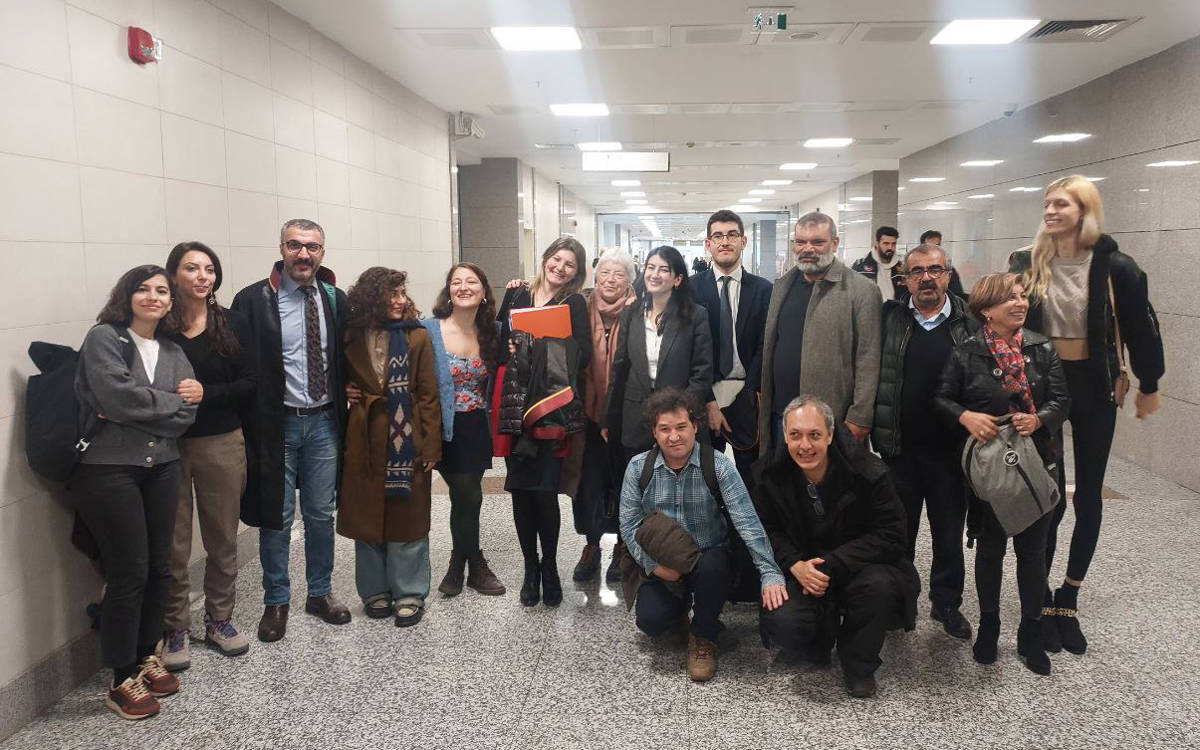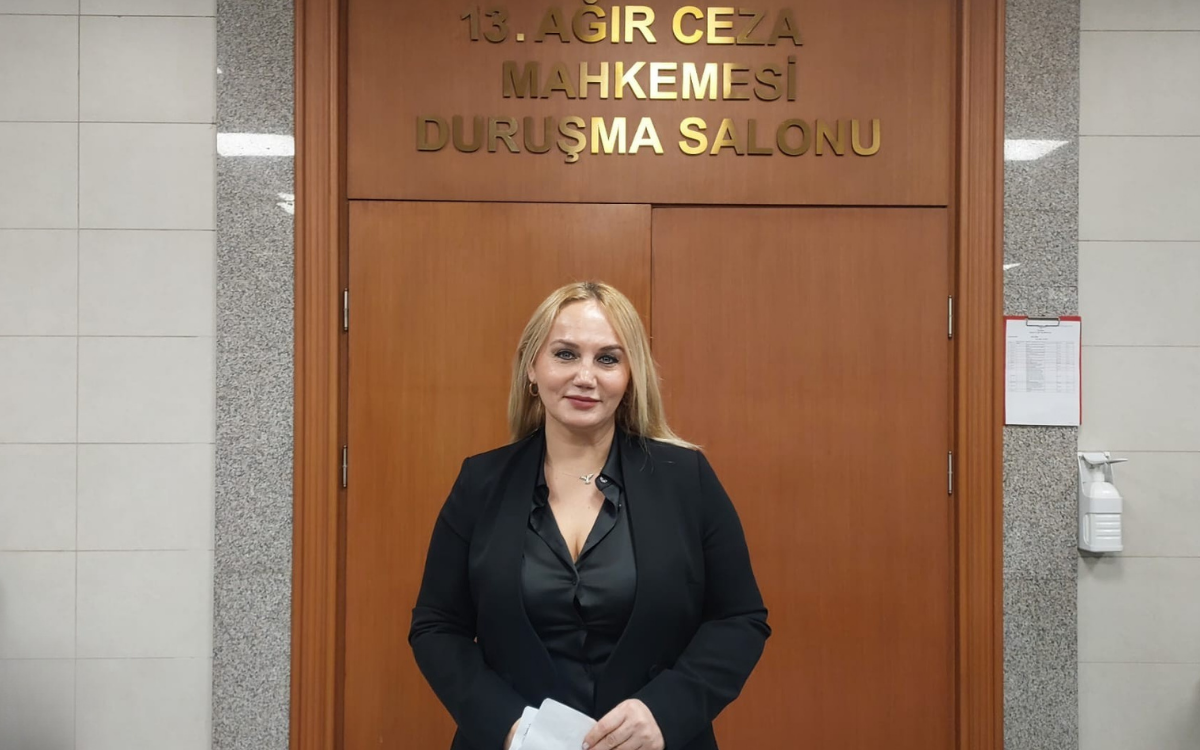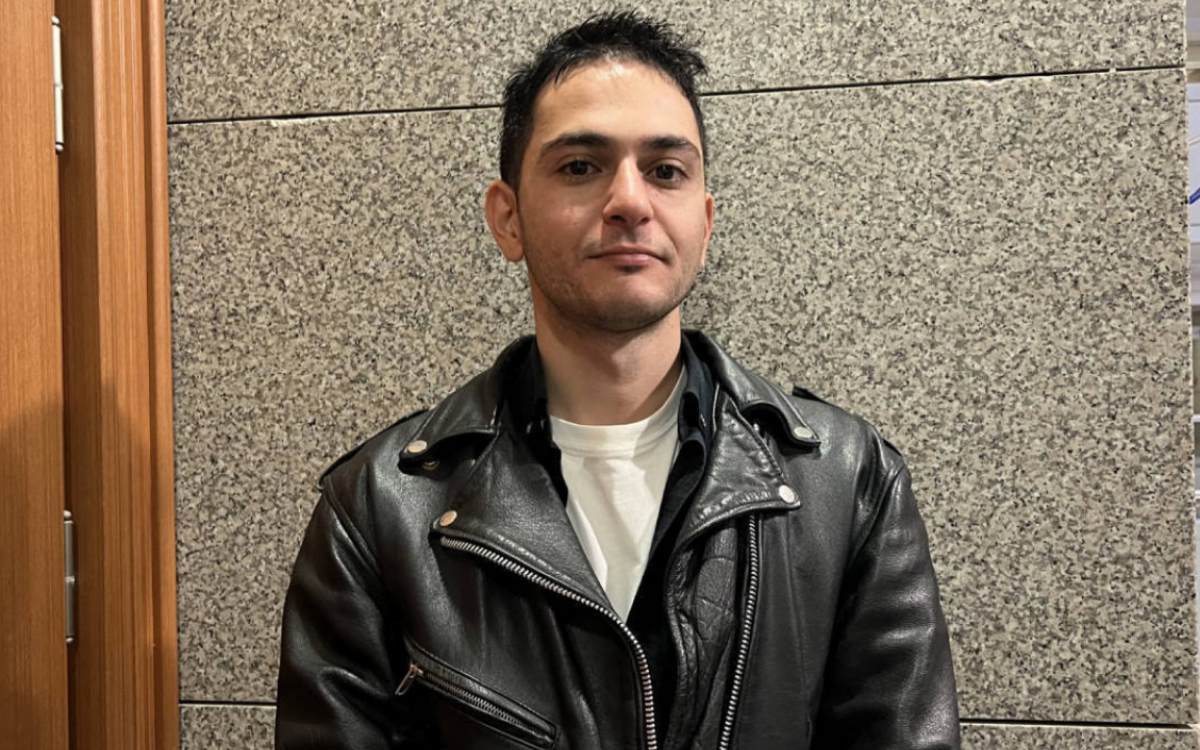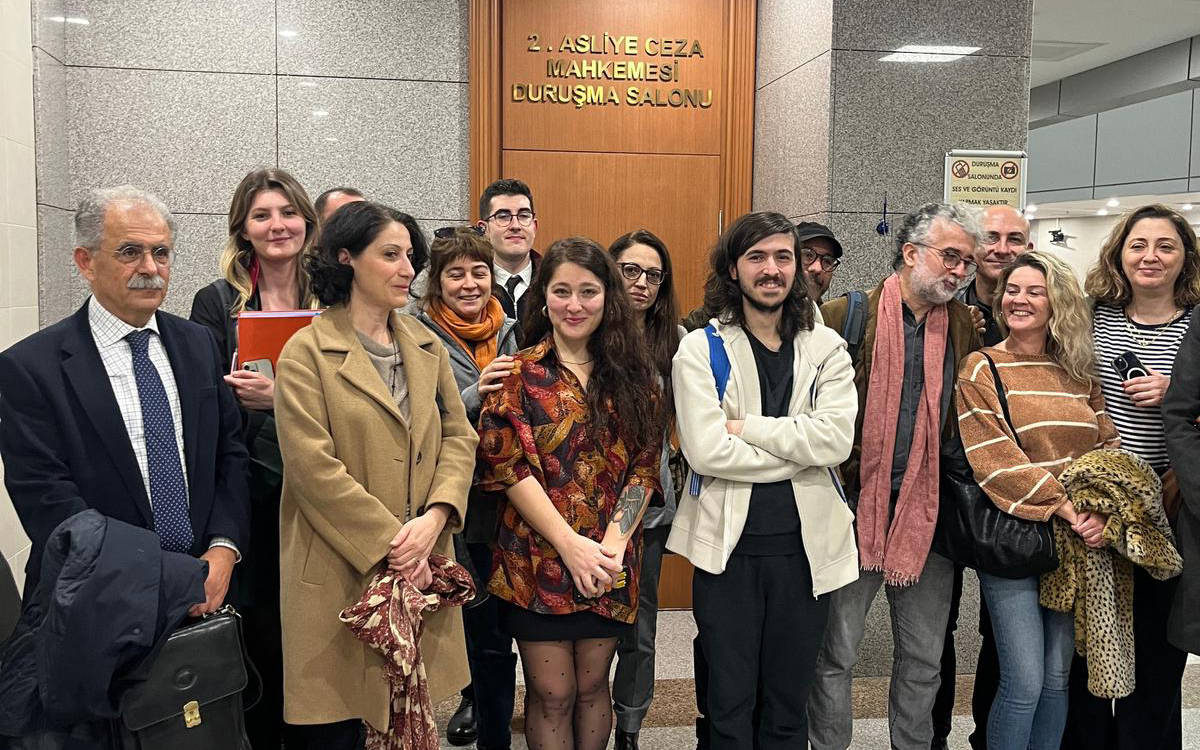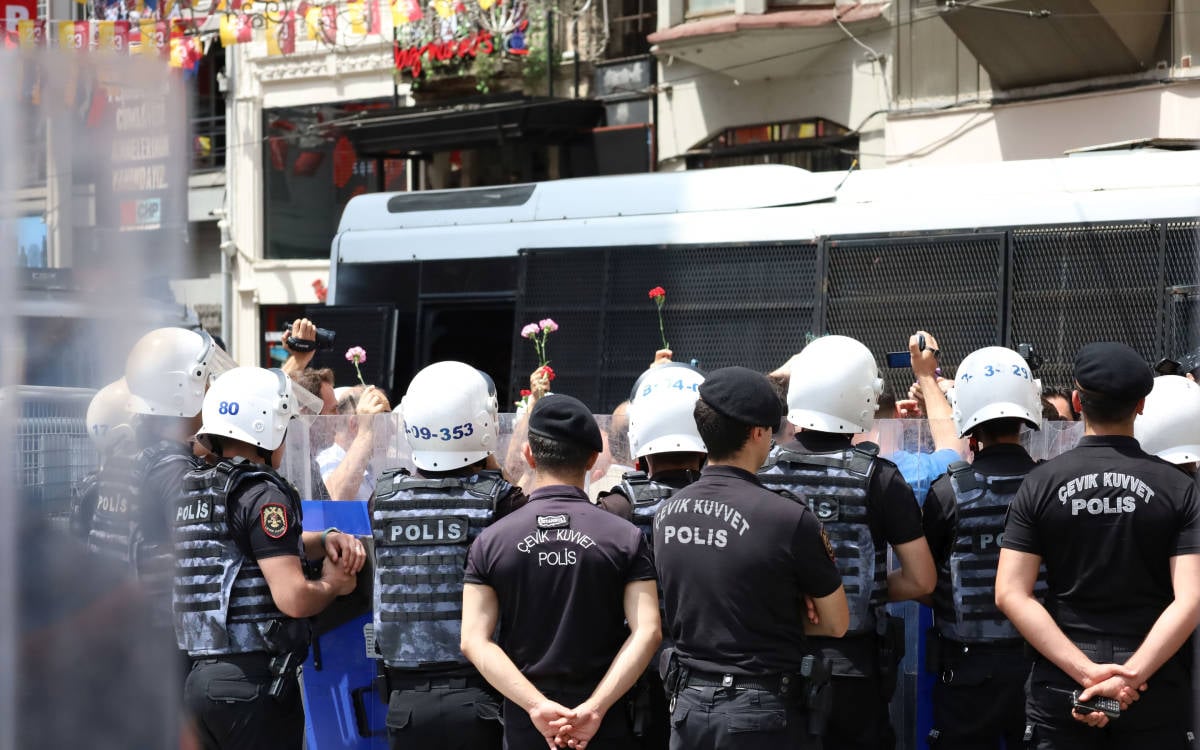Drawings: Murat Başol
Click to read the article in Turkish / Kurdish
• The case concerning the countrywide anti-government protests in 2013 was retried after an appeals court overturned the acquittals last year
• The defending lawyers say the indictment contains no concrete evidence and is solely based on presumptions
• One member of the court board was revealed to be a former prospective parliamentary candidate of the ruling AKP
• Osman Kavala, a businessperson and a rights advocate who has been kept in in prison for four and a half years despite an ECtHR verdict, has been sentenced to aggravated life imprisonment for "attempted overthrow"
• The other seven defendants have been sentenced to 18 years in prison for aiding Kavala
bianet's live blog from the courthouse:
The second session of the final hearing of the Gezi trial is taking place today (April 25).
After the rights advocates completed their statements against the prosecution's opinion at Friday's hearing, their lawyers will make statements today.
The lawyers will make defense against prosecutor Edip Şahiner's opinion at the İstanbul 13th Heavy Penal Court
Osman Kavala, who has been held at the Silivri Prison for 1,637 days, was again not brought to the courtroom. Because of a problem in the videoconference system, only his voice can be heard.
Other defendants, including Mücella Yapıcı, Çiğdem Mater, Can Atalay and Tayfun Kahraman, are present in the courtroom.
Who is on trial? Ali Hakan Altınay, Mücella Yapıcı, Ayşe Pınar Alabora, Can Dündar, Çiğdem Mater Utku, Gökçe Yılmaz, Handan Meltem Arıkan, Hanzade Hikmet Germiyanoğlu, İnanç Emekçi, Mehmet Ali Alabora, Mine Özerden, Osman Kavala, Can Atalay, Tayfun Kahraman, Yiğit Aksakoğlu, Yiğit Ali Ekmekçi, Henry Jack Barkey. Who were the plaintiffs (complainants)? 746 people, including the 61st term government. Among the plaintiffs were the then Prime Minister Recep Tayyip Erdoğan and the then Deputy PMs and Ministers such as Bülent Arınç, Ali Babacan, Beşir Atalay, Bekir Bozdağ, Binali Yıldırım, Egemen Bağış, Erdoğan Bayraktar, Ahmet Davutoğlu, Muammer Güler, Ömer Çelik, Mehmet Şimşek, Nabi Avcı, Zafer Çağlayan, Sadullah Ergin. What are the accusations? In the indictment, the Gezi Park protesters are described as "attempting to stage a coup". 16 rights defenders (+Henry Jack Barkey) are facing charges for "organizing the protests". |
.jpg) Osman Kavala trying to connect to the courtroom via the glitchy videoconference system. (Drawing: Murat Başol)
Osman Kavala trying to connect to the courtroom via the glitchy videoconference system. (Drawing: Murat Başol)
"Our defenses were not taken into account"
Mine Özerden's lawyer Tuğçe Duygu Köksal took the floor. She stressed the "coincidence" that the final hearing of the Gezi trial was the anniversary of the foundation of the Constitutional Court.
"Because evidence was not collected in accordance with the law in this file, I should not make a defense. But, at the point we have come, I will say a couple of things.
"There has been no progress in the file since February 18, 2020, when a verdict of acquittal was given. Moreover, I doubt how much consideration is given to the oral defense here and the written defense I have put in the file. Because all my requests for an extended investigation have been denied so far."
"The verdict of acquittal in the first trial was not overturned on the merits. The appeals court had demanded the evidence in the file be discussed and [the case] be merged with the çArşı case.
"After that verdict, a verdict of acquittal should be given immediately, but instead, the file was referred to the prosecution for an opinion as to the accusations. The opinion as to the accusations is an implicit opinion for acquittal.
"My client exercising their rights was described as 'assisting an attempt to overthrow the government' in the opinion as to the accusations. Since there is no crime, there cannot be assistance, either."
About swimming goggles, masks and gauze cited as evidence in the file, she said, "Swimming goggles protect against pressurized water, masks protect from gas, and gauze [is used] if [someone] is injured by batons or canisters. This cannot be evidence."
"Hypotetical conclusions"
Emel Atakktürk, the lawyer of Yiğit Ali Ekmekçi, spoke after Köksal.
"We have witnessed many times in Turkey that important and binding decisions of the Constitutional Court and the European Court of Human Rights being completely ignored.
"In Turkey, we still seem not to have learned the lesson of the importance of an independent judiciary. This trial and the accusations against my client demonstrate once again how politicized the judiciary has become.
"... The indictment and the evidence in the file are not convincing. The evidence is irrelevant to the incidents that are the subject of allegations. It makes determinations by drawing hypothetical conclusions despite there is no connection between the incident and the defendants. The allegations are not crimes."
Judge and prosecutor looking at their phones
A judge and the prosecutor were checking their phones while lawyer Ataktürk was giving her statement. They stopped doing that after one person among the audience interrupted the lawyer to warn them.
"We are struggling to disprove a non-existent crime"
After Ataktürk completed the first part of her statement, the other lawyer of Ekmekçi, Hasan Fehmi Demir, took the floor.
"This case is a 'Where is my crime?' case. It is not possible to disprove these allegations. Our clients are struggling to disprove a crime that does not exist.
"A judicial process that we can call 'abusive' has started in Turkey. The separation of powers have been completely abolished in Turkey. It has become impossible to talk about an independent judiciary.
"Judges and prosecutors have turned into functionaries of the executive organ. One of the most important cases proving these findings factually is the case that is being heard right now."
Microphones malfunctioned
Bahri Belen spoke after Demir. Fikret İlkiz, the lawyer of Can Atalay, Mücella Yapıcı and Tayfun Kahraman took the floor after him.
After the microphone system malfunctioned, the presiding judge gave a half an hour break. The hearing resumed at 1.30 p.m. local time.
"Non bis in idem"
After the break, İlkiz started his statement. He said the following in brief:
"If the Security Directorate gives orders to the prosecutor's office, what happens is a summary of proceedings longer than 2,000 pages and a 657-page indictment.
"None of you attended the trial at the 30th Heavy Penal Court (The first trial in Silivri). But we are experiencing the same things over and over again. Judicial organs do not have the right to make people defendants to make them repeat the same things.
"When the İstanbul 30th Heavy Penal Court ruled for acquittal, it said these were the fruits of a poisonous tree. In its detailed ruling, it said Osman Kavala was not the financier of Gezi.
"Now, we have a case filed because of the same act. The rejection of this case is required. If there was a previous criminal investigation, if a criminal case was filed, non bis in idem (a legal principle that no one should be judged twice for the same offense) are among the rules that should be especially taken into consideration. With this, it is aimed to ensure a fair trial and guarantee legal security."
İşler repeats Tora Pekin's defense
Lawyer Evren İşler took the floor after İlkiz.
"We all know that the investigation file that this case is based on is open. From time to time, people are picked from this investigation, where we don't even know the suspects, and put on trial. But this indictment in front of us does not have any element of an indictment.
"But let me explain anyway... Let me explain even if no one from the [court] board listens to me... Calling something that these people touched evidence is unfair to law, or what is left of it in this country. No discussion about the evidence was made before you. Requests were rejected. The right to a fair trial was violated so much that... When Tora Pekin spoke about this issue, the evidence against law, you did not listen to him. But you will listen to me now."
İşler then read out Tora Pekin's statement from Friday's hearing.
"A judge was a prospective candidate from AKP"
Then she said the following:
"We had a meaningless process of merging [Gezi and çArşı trials], and then a verdict of separation was given quickly. In its verdict, the appeals court pointed to the çArşı case, saying, 'You have no evidence, look there.' You looked at it, you couldn't find anything and you returned the file.
"Demanding the resignation of the government is not a crime. Until this indictment about the defendants was written, governments had been changed many times. If the government thought there was an uprising against it, it would not have waited for six years.
"Was there a fair trial, or was there even a trial in this case? No. A fair trial is not such a simple thing ... A fair trial should be reflected in society. Citizens should feel that there is a fair trial.
"When we search the names of the members of the court board on Google, we see that judge Murat Bircan resigned from Bafra Municipality Directorate of Legal Affairs and became a judge. Murat Bircan became a prospective parliamentary candidate from the AKP [the ruling Justice and Development Party]. In this case, Erdoğan [Recep Tayyip, the president] is an aggrieved party. Is there a need for instructions? The member judge already likes him."
The judgment
After the last words of the defendants, the court recessed the hearing to write its verdict.
Following the 45-minute break, the audience was let in the courtroom and the verdict was pronounced.
Osman Kavala was given an aggravated life sentence for "attempting to overthrow the government" as per article 312 of the Turkish Penal Code. He was acquitted of "espionage"
Mücella Yapıcı, Çiğdem Mater, Hakan Altınay, Mine Özerden, Can Atalay, Tayfun Kahraman and Yiğit Ali Ekmekçi were sentenced to 18 years in prison for assisting the "attempted overthrow." The court ruled for their arrest.
After the verdict was announced, the audience booed the court board and chanted, "Everywhere is Taksim, everywhere is resistance," the slogan of the Gezi Park protests.
About Gezi trialThe Gezi trial began again on May 21, 2021 as the court of appeals overturned the verdicts of acquittal given by the local court. Arrested for over 1,200 days, businessperson and rights defender Osman Kavala and 15 other defendants appeared before the judge at the İstanbul 30th Heavy Penal Court in Çağlayan on charge of "attempting to overthrow the government." Here is a brief overview of the judicial process: Who stood trial?Osman Kavala, Mücella Yapıcı, Can Atalay, Tayfun Kahraman, Ali Hakan Altınay, Yiğit Aksakoğlu, Yiğit Ali Ekmekçi, Çiğdem Mater Utku and Mine Özerden, who were acquitted in the first trial; and Can Dündar, Mehmet Ali Alabora, Ayşe Pınar Alabora, Gökçe Tüylüoğlu, Handan Meltem Arıkan, Hanzade Hikmet Germiyanoğlu and İnanç Ekmekçi, whose files were separated, but have been merged again afterwards. Even though he was acquitted in the Gezi trial, Osman Kavala was continued to be kept behind bars in Silivri Prison at the outskirts of İstanbul. Yiğit Aksakoğlu also served 220 days behind bars in the Gezi trial. Who were the aggrieved parties?In the Gezi trial, where rights defenders were acquitted, the members of the 61st term cabinet, which was established in 2011, were referred to as the complainant aggrieved parties in the indictment. On the list of the aggrieved parties were the then PM Recep Tayyip Erdoğan, the then Deputy Prime Ministers Bülent Arınç, Ali Babacan, Beşir Atalay, Bekir Bozdağ, Emrullah İşler and the then Ministers Binali Yıldırım, Fatma Şahin, Egemen Bağış, Nihat Ergün, Faruk Çelik, Erdoğan Bayraktar, Ahmet Davutoğlu, Taner Yıldız, Suat Kılıç, Mehdi Eker, Hayati Yazıcı, Muammer Güler, Cevdet Yılmaz, Ömer Çelik, Mehmet Şimşek, Nabi Avcı, İsmet Yılmaz, Veysel Eroğlu, Mehmet Müezzinoğlu, Zafer Çağlayan and Sadullah Ergin. After founding the Future Party, Ahmet Davutoğlu announced that he withdrew from the files of criminal cases related to the crimes committed against him personally and were not of public nature, especially from the trials for insult, as an aggrieved party. DEVA Party Chair Ali Babacan also said, "I am not a complainant in the Gezi trial, nor am I an intervening party. Thinking that they were aggrieved, the prosecutor wrote the names of all members of the then government one by one. In our judicial system, there is no such thing as withdrawing from the position of an aggrieved party." What were the defendants charged with?In the first 657-page indictment, Gezi was defined as "an insurrection for coup". The defendants were accused of "organizing and funding the protests." They were charged with "attempting to overthrow the government", "damaging property", "damaging places of worship and cemeteries", "violating the Law on Firearms, Knives and Other Tools", "aggravated plunder" and "violating the Law on Protecting Cultural and Natural Assets." In reversing the acquittals, the court of appeals also demanded that a criminal complaint be filed against the defendants on the grounds that they violated the Law no. 2911 on the Meetings and Demonstrations. According to the indictment, 16 defendants separately faced 606 years to 2,970 years in prison. The first trialIn July 2013, 26 people, including Mücella Yapıcı from the Chamber of Architects and Ali Çerkezoğlu from the İstanbul Medical Chamber, were detained. While they were released following their statements, the rights defenders faced a lawsuit for "founding and leading an organization" in March 2014. All defendants were acquitted in the ensuing trial heard by the İstanbul 33th Penal Court of First Instance on April 29, 2015. Afterwards, it was understood that prosecutor Muammer Akkaş was carrying out an investigation against the people who are currently on trial. Akkaş was also the person who gave the instruction to wiretap the rights defenders' phones. However, he was dismissed as part of an investigation into the December 17-25, 2014 operations and fled Turkey. İstanbul Public Prosecutor Yakup Ali Kahveci took over the file after Akkaş. The investigation, which also consisted of the evidence collected by Akkaş, was completed in 2019; the first hearing was held on June 24. Arrested pending trial, Yiğit Aksakoğlu was released at this hearing. A fews days after the second hearing, the Board of Judges and Prosecutors (HSK) changed the court board hearing the case. Accordingly, Galip Mert Perk was assigned as the Presiding Judge and Talip Ergen as a member of the court board. While the HSK did not change the place of duty of senior member Ahmet Tarık Çiftçioğlu, who had ruled in favor of the "continued arrest" of both Osman Kavala and Yiğit Aksakoğlu, the member of the court board who had expressed a dissenting opinion to the related ruling was assigned to another court. Examining the individual application of Osman Kavala, the European Court of Human Rights (ECtHR) pronounced its ruling of right violation on December 10, 2019 and ruled that Osman Kavala should be released immediately. At the final hearing on February 18, 2020, all defendants, except for the ones who were abroad, were acquitted of the offenses charged. Despite this acquittal and the ECtHR judgement, Osman Kavala was arrested again on another charge. Why they stood trial again?Following the acquittals in the Gezi trial, President and Justice and Development Party (AKP) Chair Recep Tayyip Erdoğan spoke at the group meeting of his party. Targeting Kavala, he said, "The person who stirred up Gezi was behind bars. They tried to acquit him with a maneuver." Shortly after this statement was made, the Board of Judges and Prosecutors (HSK) launched an inquiry against the three judges who were the members of the board of the İstanbul 30th Heavy Penal Court. The prosecutor's office also appealed against the verdicts of acquittal. Public Prosecutor Edip Şahiner demanded that the acquittals be reversed. The 3rd Penal Chamber of the İstanbul Regional Court of Justice, the court of appeals, reversed the rulings of acquittal handed down by the local court, the İstanbul 30th Heavy Penal Court, on January 22, 2021. Referring to the charges brought against the defendants in the indictment, the court justified its reversal by indicating that the pieces of evidence such as the defendants' social media posts, press statements and slogans chanted were not considered in handing down the ruling. The second trialThe final hearing of the second trial took place in two sessions on April 23 and April 25, 2022. Osman Kavala, a businessperson and a rights advocate who has been kept in in prison for four and a half years despite an ECtHR verdict, was sentenced to aggravated life imprisonment for "attempting to overthrow the government" while he was acquitted of "espionage." Mücella Yapıcı, Çiğdem Mater, Hakan Altınay, Mine Özerden, Can Atalay, Tayfun Kahraman and Yiğit Ali Ekmekçi were sentenced to 18 years in prison for assisting this crime. |
(HA/MD/VK)






tyjty.jpg)
